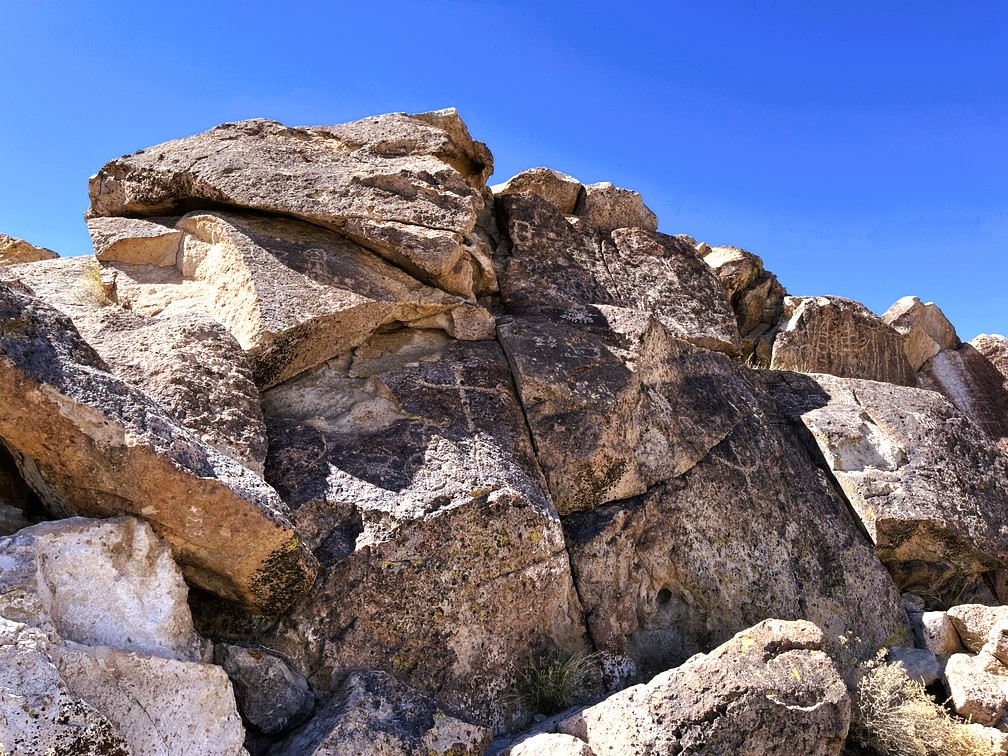Because Back East There Are Only Graves
You’re not surprised that on my 70th birthday
I set out heading west from Eden,
like my great grandparents,
imagining, like them, a gospel horizon.
You’re not surprised at the landscape
of my misunderstanding—how, first,
the gentle vapors of the Smokies vanished
in the rearview, then the Cumberland Plateau,
the Mississippi, how, next, the land
flattened for days then rose all at once
into rows of enormous teeth,
how the most lonely, hostile parts of myself
came right along, still the craving,
still the knot of self-doubt, still the restless appetite
to be known. You won’t be surprised then,
surely, that now, long before these desert stars
begin to dim, I am unearthed
from sleep, home-hungry, hunting daylight.
______________
Kathy Nelson
Review by Philip Kirsch
I love the geographic (geologic?) metaphors of this poem, how the travel over landscapes mirrors the poet’s inner terrain.
There is nothing back east; it is all figuratively or literally dead, so she is setting out, like her forebears, into that revelatory promise of change – the west. But “the landscape of misunderstanding” rears its head as she travels across the country, and “the land…rose all at once/into rows of enormous teeth” [I love this!] as “the most lonely, hostile parts of myself” accompanied her.
So, as she says, we “won’t be surprised” at her sleepless nights (“unearthed from sleep”), that she longs for what she left, or what she may wish she could leave behind.
Review by Massimo Fantuzzi
Some are in bed-sheets, some are in blouses,
Some are in smocks: but truly there they are.
Now they are rising together in calm swell
Of halcyon feeling, filling whatever they wear
With the deep joy of their impersonal breathing;
(from R. Wilbur, Love Calls Us to the Things of This World.)
Again in this issue we look at our hands, we stop and look at the portfolio of what is in our hands. Baggage of physical and metaphysical realities, small or large, meanings and signifiers, only apparently a jumble of irreconcilable objects, the connection, the common denominator is us, relations and attachments, a question of what is, good or bad, dear to us and us alone, as we roll this boulder uphill (until it’s all gone). House, home, nest. What do we take with us, of us? What will stick, what will wash away, it’s a question of love.
(editor’s note: Massimo reviewed a different poem from a batch submitted to us that ended up being published elsewhere (How I Moved to Nevada)–due to my mistake he thought we had accepted and were publishing it. But I think his review still stands and could apply to this poem–it’s a good review, and I don’t want to waste it.
Review by Michael T. Young
There’s a wonderful texture and nuance to the music of this poem, such as the V’s in the line “gentle vapors of the Smokies vanished / in the rearview” or that alliterative closing in “home-hungry, hunting daylight.” These musically descriptive pieces go along with that “landscape / of my misunderstanding,” how it articulates the need to get away from the past, those graves in the title. But as we know, most of our problems in life arise from who we are, and we carry that everywhere, thus “the most lonely, hostile parts of myself//came right along.” No matter where we go, we are searching for home, which is often what we left behind. We’re looking to be comfortable in our own skin, and this poem embodies that desire and pursuit beautifully.
Review by Carla Schwartz
I am not sure about the title of this poem- it’s mysterious though, and for that I like it. I like how it provides a reason for the speaker’s moving west. I wonder who the “you ” is in this poem. I do not understand “surprised at the landscape//of my misunderstanding.”. I was wondering if this is just a juxtaposed metaphor, and the speaker meant “surprised at my misunderstanding//of the landscape.” Or is there a misunderstanding with the “you” of this poem? The former makes more sense with what follows the m-dash in the 3rd stanza. I love the image of the terrain described as “rows of enormous teeth.” I love all the “h” sounds in the last line. It’s a beautiful last line. As a reader, I don’t understand from this poem how “west” is “home” for the speaker, especially if the title give the reason for leaving east (that everyone has died).

